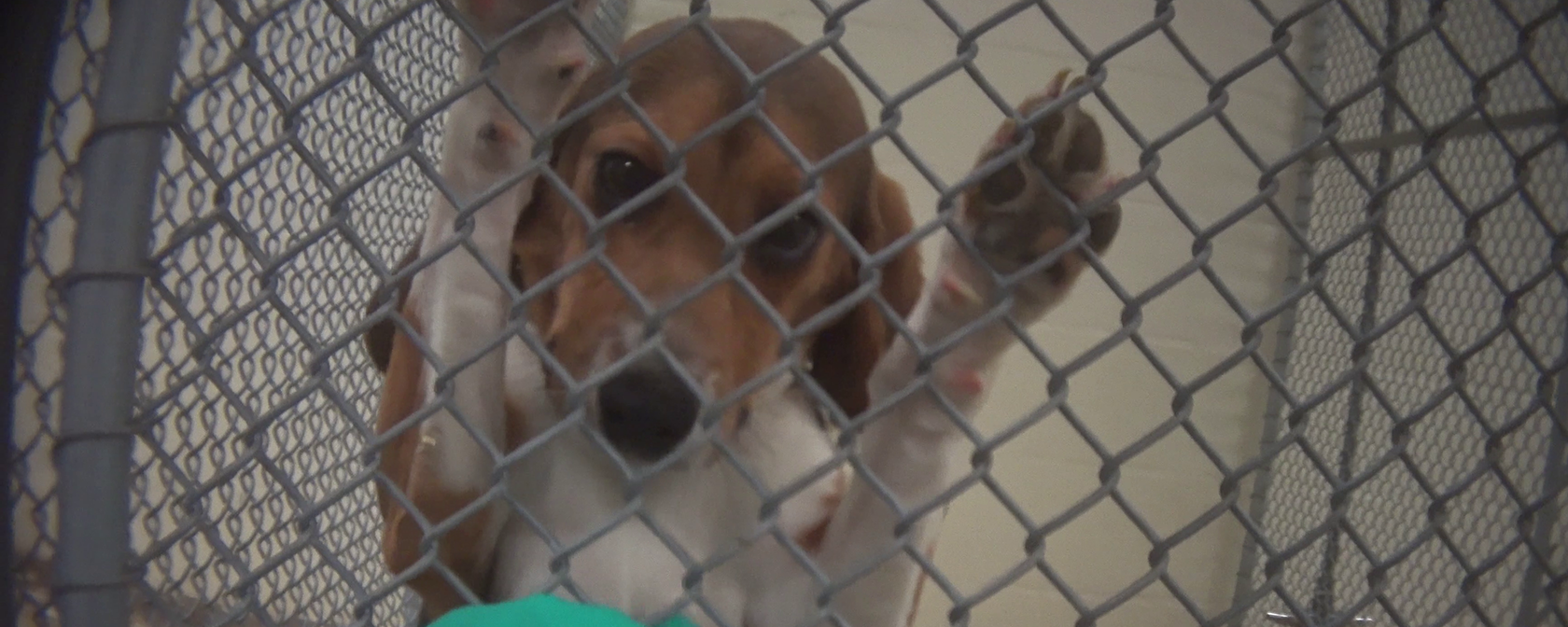By Sara Amundson and Kitty Block
Update 5/16/2022: Over the last few days, 160 legislators from 32 states have co-signed a letter to the CEOs of Inotiv and Crinetics, urging the release of the dogs and pointing out that 14 states have approved legislation to authorize adoption of animals released by laboratories.
Weeks after we released the results of our seven-month undercover investigation at Inotiv, an Indiana animal testing laboratory, we continue to press for the release of 82 beagles there as an urgent matter.
Eighty of the dogs are being used in toxicity tests conducted by Inotiv and paid for by Crinetics Pharmaceuticals, a company based in San Diego, California. Thirty-two of the dogs are going to be killed next week when the first test ends.
But not if we can help it. They’ve suffered enough and they deserve a chance at adoption into loving homes. There is no blanket legal requirement from the U.S. Food and Drug Administration for dogs to be used as test subjects or to be killed at the end of toxicity tests, and there is no scientific reason for doing so. If Inotiv or Crinetics has been instructed to kill the dogs by any regulatory agency, we would like to see the proof. The companies can acquire and use blood samples, observational data and tissue material that might be of use through non-lethal procedures. There is no need to take the animals’ lives.
Over a quarter of a million individuals who support that view have signed our petition calling on Inotiv and Crinetics to spare these dogs and give them a second chance. Our experience in a 2019 case made it clear that there are many people willing to adopt animals spared from unnecessary deaths in a laboratory. In fact, this humane solution is becoming ever more common—it’s being embraced by political, corporate and institutional stakeholders, including the FDA. Some fourteen states have passed legislation to authorize adoptions, too, and this week, in the same spirit, dozens of legislators from 16 states signed a joint letter asking the two companies to release the dogs.
In a sense, these 80 dogs—along with millions of other animals used in tests by companies like Inotiv and Crinetics—are victims of ambiguity. Ambiguity continues to surround testing requirements and the value of animal models in testing. We have been arguing for a long time that regulatory agencies such as the FDA and its counterparts in other nations must expand and strengthen their commitment to the implementation of rapid, sophisticated and relevant non-animal tests to assure human safety and detect toxicity. We have also challenged companies and laboratories in the sector to make stronger investments and effort on the research and development side. There’s no room for complacency with millions of animals’ lives at stake.
Then there’s moral ambiguity, the feeling on the part of so many that it just is not right to do such wrong to dogs, who are so trusting and dependent on our mercy. One thing that stood out for our investigator was the moral confusion of co-workers in the facility. “One of the things that a lot of my co-workers liked to talk with me about was their animals,” the investigator recently observed. “One tech had a cat, multiple reptiles, and loved rats and pigs. Another tech would often show me videos of his dog at home playing. In our tech office, almost every desk had family pictures, including their dogs.”
That moral confusion led to rationalization too, the investigator went on to write, noting that the discrepancy was disconcerting. “I would often be told these dogs are different because they are bred for testing, and they would never be good house pets. I have to think that reasoning is only a self-preservation mechanism for the techs. A way to protect themselves from accepting what they are doing is wrong. Many of the techs came from a vet tech background, leaving vet practices for a higher paying job as a lab animal tech.”
On April 29, HSUS staff members brought boxes of petition signatures close enough to Inotiv’s doorstep in Indiana to make the point that we will not give up on these dogs. Over the next several days, at events in other states where Crinetics and Inotiv have footprints, we’ll make the case again. One of the states is Maryland, where Inotiv has reportedly received a pledge of four hundred thousand dollars from state and local governments for expansion. There, we’ll be joined by legislators and labor groups concerned about the dogs’ fate.
In a recent Remington Poll, almost three-quarters (74%) of those polled oppose the use of dogs in toxicity tests for products such as pesticides, drugs and food additives. Nearly as many (71%) believe that the government should make stronger investments in developing non-animal methods for biomedical research and product testing. Finally, 79% say they would support a legal mandate to give healthy dogs an opportunity to be adopted as pets after their time in laboratories is over.
The writing is on the wall regarding the continuing use of dogs and other animals in laboratories. The landscape has shifted on this issue, and Inotiv and Crinetics should acknowledge as much. We hope that they will seize this opportunity for leadership on this issue by giving these long-suffering animals the gift of new and better lives and tacking swiftly toward the era of testing methods that don’t involve animals.
Kitty Block is President and CEO of the Humane Society of the United States.




